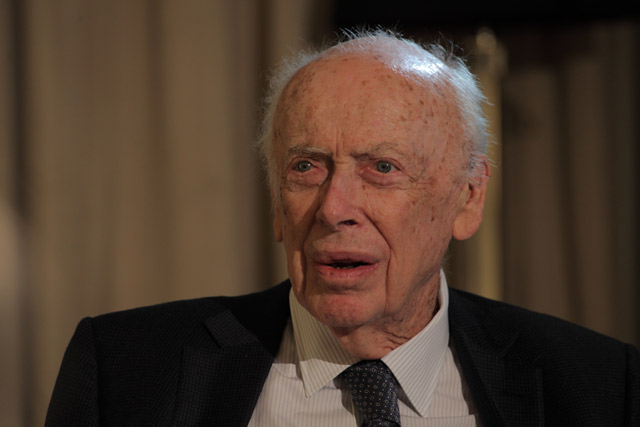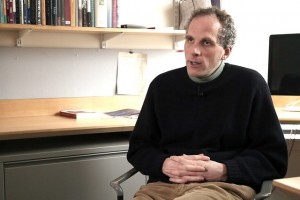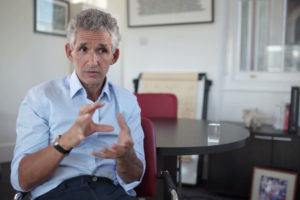Limits of Genetic Explanation of Disease
Culture of Medicine professor, David S. Jones, on the age of genomics, alternative ways to help society, and t...

During his visit to Moscow on June 24, 2015 Nobel Prize winner, one of the discoverers of the DNA helix, James Watson, gave an interview to a website about contemporary science “PostNauka”, the “Sputnik” news agency and the “V Mire Nauki” magazine – the Russian edition of “Scientific American”. With the consent of our Russian partner “PostNauka” we are publishing the original interview.
In your opinion, what is the biggest thing we are still to find in the human genome?
The genome is the instruction book for life. So, over the past 40 years we’ve been trying to find the instruction book for cancers. And that’s went very helpful in telling us, how cancers arise. In most cases it doesn’t tell us how to cure the cancer. And the great objective is cured cancer. So that I’ve devoted most of my life to that. And I think we may be getting close to, you know, probably being able to cure many types of cancer, which up to now have been called incurable. So I think there will be hopefully a quick triumph for science. I think human beings move forward through knowledge.
You noticed cancer. How would you assess the current state of science? How soon can we find the cure from cancer?
I surely have my fingers crossed here. Two drugs are now being tested that might provide real cures for some cancers now we can’t cure. So, if we’re all lucky, they’ll be certainly available in two years. I want to not die before cancer is cured. Some cancers, you know, are cured. But it’s just knowing what the cancer cell is, and how it operates. Not really DNA knowledge, what we call biochemistry. Just how does the cancer cell grow and multiply. And that’s all in chemical reactions that how much life is raised, and it’s very complicated. And some people think that all cancers are different and we’ll need hundreds of different ways. There’s good reason that most cancers have a lot in common and sort of biochemistry that normal cells don’t, and if we stop this abnormal metabolism, we’ll stop the cancer.
There are many other aspects of life like how the brain works and brain disease. We’re not going to sound loathsome. You know, we have the DNA sequence. I have a son with a schizophrenia-like condition. And there is no medicine that helps him. Because we don’t know how to cure it. The brain is just so complicated. Understanding cancer is understanding a single cell. Schizophrenia is a large part of the whole brain, which is abnormal.
Seven years ago, in a talk with Sergey Kapitza, you said about the moment to change our thinking of human behavior. And what depends on genes, and what depends on experience of a human. Do we have any progress in this field in the last 7 years? And the same question about psychic diseases.
A lot of people didn’t want genes to be important. I think most people, who wants to have children, convinced their personality has come from their genes, not from their parents. But it’s still complicated. I’m sort of old-fashioned. I sort of think genes are quite important. Some people think they aren’t, and I can’t argue with them, because we don’t really know what the brain is and how it works. So we’ll always develop. But I think it’s a great mistake to say: “We’re all the same, even though we have different genes”. We have different genes!
But I’ve got a great difficulty by my belief in genes, and I just hope there is more evidence soon. But it’s a hard problem I’ve disentangled. Sometimes people don’t want to know the answer. But I’ve always thought you better off, if you know the answer.
We’ve made enormous progress since DNA helix had been found. You know, it’s going much faster than I thought. But still, things aren’t going, you know, to happen every day or every year.
Before we could work with human genome, a number of us hoped that the number of genes wouldn’t be very large, but now we have evidence that hundreds of genes, if they are not functioning correctly, can lead to mental disease. So it’s really a very complicated problem.

The reason why mental disease is so common is because there’s so many different ways to get it.
Some genetic disease, most people make it swearing. Well, individual genes, you know, that’s rare. But if you can have a thousand genes, which if they’re not, each of them, if they’re not working, well, you have a mental disease.
Then you have about 5% of people are born with their brain not working. You know, the healthy parents, not that it’s inherited, it’s just, there is just a natural mutation. This is a very big problem, and hopefully, we’ll have drugs and we’ll solve it someday. But for my lifetime, if I can see a cured cancer, I will say: “well, I’m pretty fortunate”.
When do you think we can expect the appearance of the so called “personalized medicines”, based on the structure of a person’s genes? Do you think that’s the future, and we should be hoping for them?
I think I slightly oversaw them. Knowing what gene is wrong won’t give you cure. So we need drugs. You might get the emphasis that everything is just looking at DNA and then we’ll be a big step forward. We’ll only have a big step forward, when we have a drug, which makes you healthy. And that’s sort of chemistry. So I believe that the most important people now are the chemists, not the DNA people. DNA people can do their job, and we know it’s been of a great triumph, but by itself it won’t cure cancer. We’ll have to do chemistry.
And the big project, which I have started, the Human Genome Project, that’s very important in studying the chemistry. So, it was something we had to do, we did it, and now we’re using it in a very important way. So it’s not that DNA work is not relevant, but it’s not the whole thing, you have to do more.
The discussion is should you change human beings. And my own belief is yes. Because some of us, you know, have bad genes, and if you could ensure that your bad genes didn’t live further in your children, that would be wonderful. So, I think, regulating it would be a big mistake.
If some people want to risk their lives, it’s their choice. The cosmonauts, who went into the space, they knew it was dangerous. But on the other hand, there was a very well run program, and so for the most part space travel is safe. So I think precautionary principle will destroy modern society. It will just make everything stay all the same, it couldn’t move forward. So I would hate to be born with precautionary principle governing me.
There were, who said: how do you know you want to know the structure of DNA? The US stopped people at different levels. You know, if you find out what DNA is, then maybe you’re going to change it, so we won’t let you do it so.
Having the science move forward as long as it doesn’t harm someone. I didn’t like religions telling me how to behave, because it seems so arbitrary. And in this case, I think that would just make the world so dull. And then, you know, then we’ll have a disease and not allowed to fight it. So, to me it’s fighting the wrong enemy. And life will never be without risk.

Culture of Medicine professor, David S. Jones, on the age of genomics, alternative ways to help society, and t...

Biologist Tim Spector on the overall weight of our microbes, remembering our natural roots, and the importance...

Can Hydrogen Technologies Be Made Efficient and Eco-Friendly?